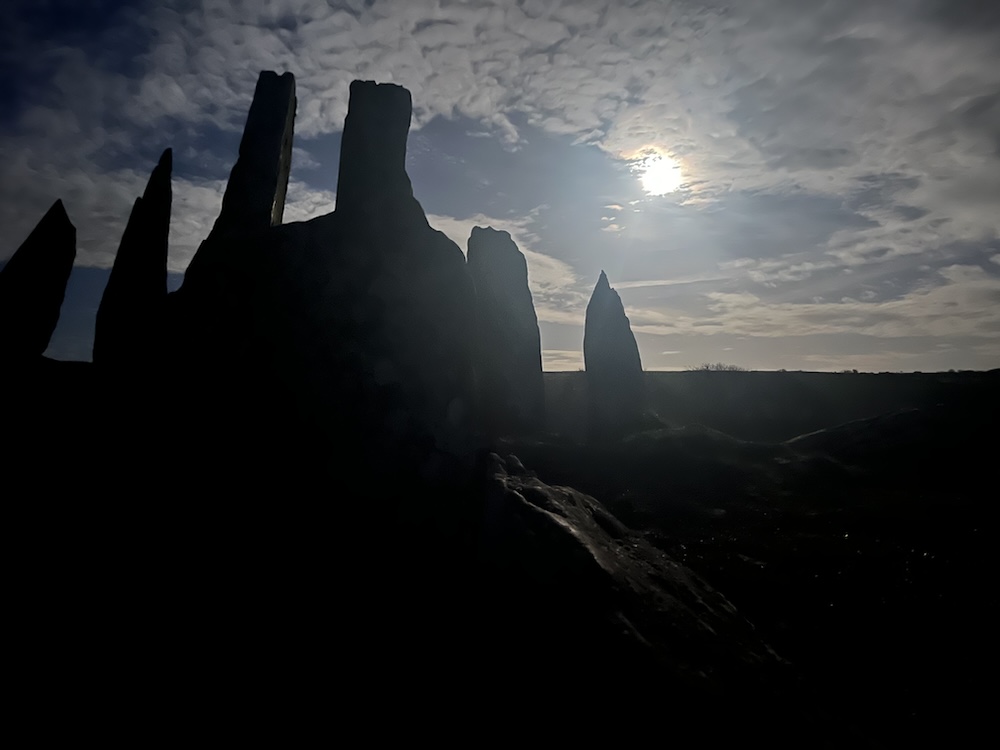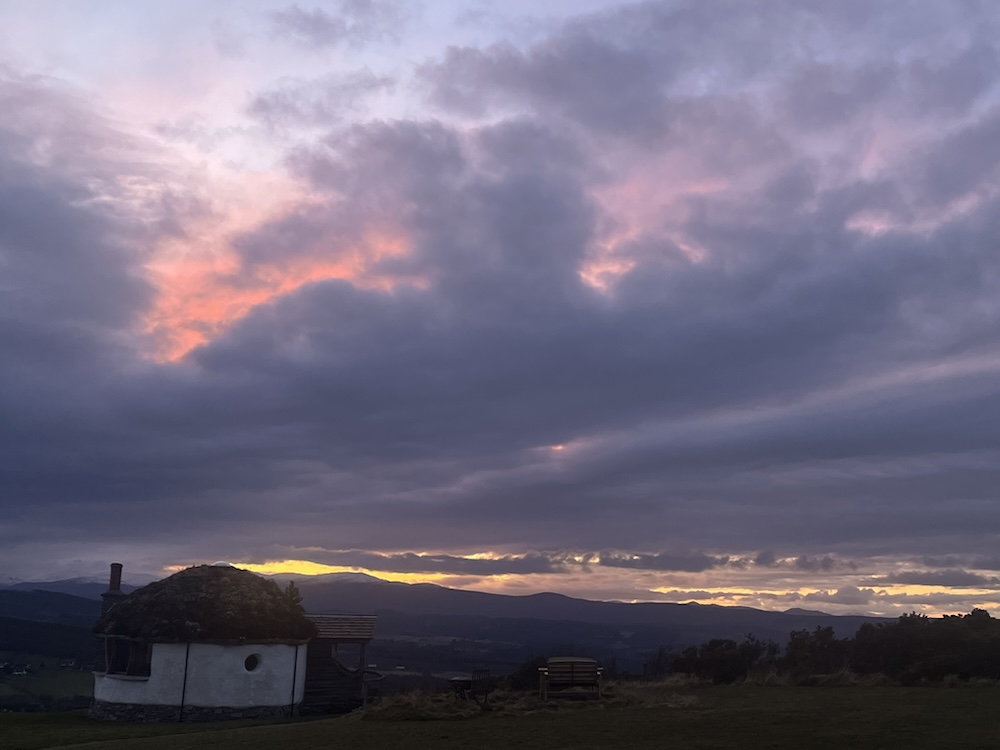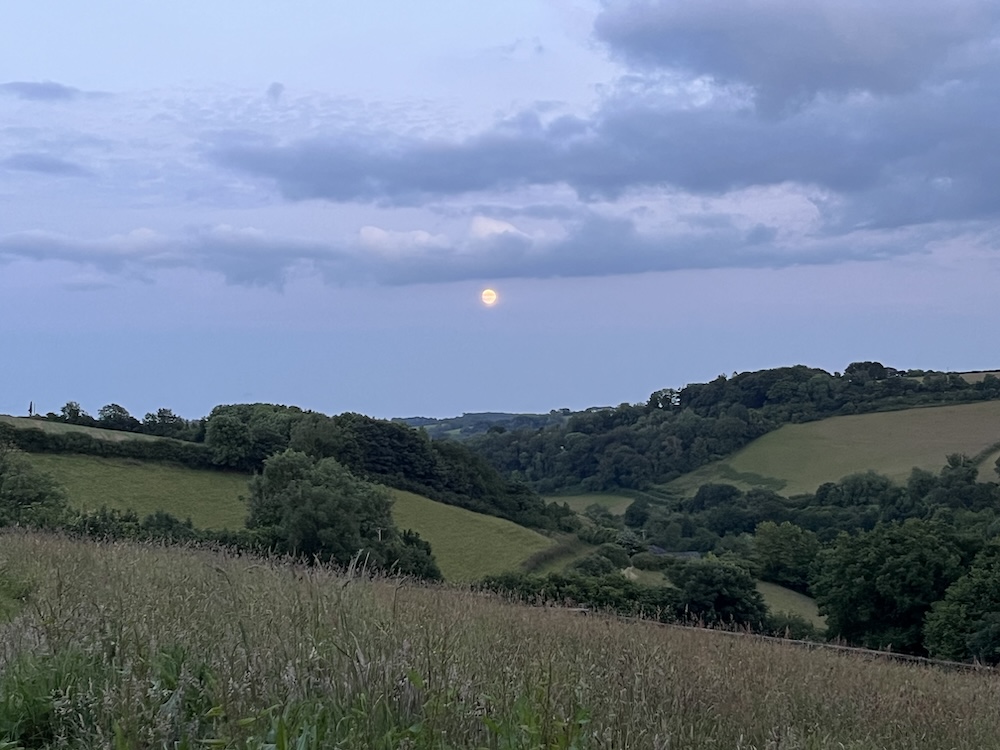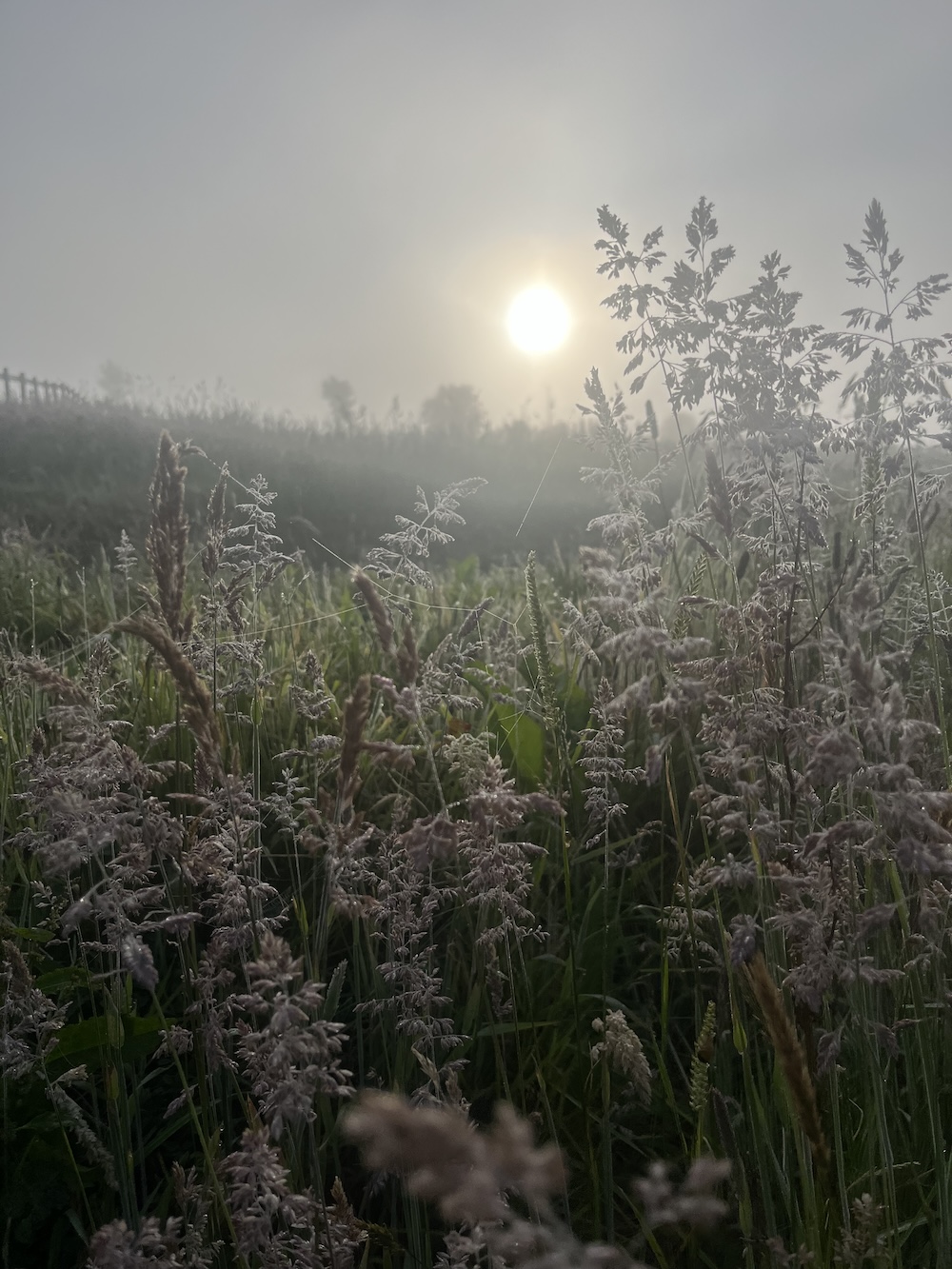Kirsteen McNish’s latest reflection on ancient landscapes, relocation and family life comes from between English moorland and Scottish mountain.

In late March I travelled to Scotland from Devon, to a self-directed writing retreat — my first time alone for more than a weekend in over 14 years. I almost do not know what to do with all the feelings flooding through my chest as towns and a city whizz past in this long snaking tin can. I make the journey to the Highlands via a stopover in Dumfries and the platform feels like a rotor-walled fairground ride as my feet trip over each other in my haste to meet my friend — the rhythm of the train still pulsing within me. Two days are spent with them kindly driving me from place to place and to ancient sites, the lonely graves of my ancestors at Kirkmabreck and the Cairn Holy stones that overlook the deep valley into Wigtown Bay.
It is at Cairn Holy I unexpectedly meet a man who bounds around the stones like Tigger, seemingly taking measurements, notes and photographs, looking, and quizzically looking again. To witness this at first almost feels like a performance — he is so animated, with the air of a former member of a 70’s rock band, or an enthusiastic science teacher — but what I soon learn is that he is really a kind of astral architect. I am introduced by my friend to “Holy Joe” and he asks questions about what I see as we hover at the chamber entrance. It turns out he is here every day, day and night. I tell him I notice engravings rather than weather-worn headstones; deep scored ridges like waves on the chamber stone and the way the sun is hitting them in turn making them seem like ancient chess pieces. He explains that under the Equinox moon tonight seven planets will be aligning, seven years since the last occurrence of this constellation, and I wince — it is seven years to the day since my sister died. The reason I am here is to remember her, and mark what is lost. Seven years is also half the time my daughter has been alive — and my sister was the only person that has ever offered to be my daughter’s guardian whilst she was alive, despite having seven children of her own. My eyes feel like the ambers of a cigarette, scorching and fizzing.
Our conversation weaves and winnows and we all agree to meet here later under the full moon. I fish around in my pocket for a small, flat stone that is shaped like a young seabird’s head, found on my favourite beach. A stone I have been turning in my pocket for months, smoothing it between the pads of my thumb and forefingers for comfort. I press it into Holy Joe’s hand as I want to give him something, anything, for the elucidations he has bestowed upon us from this chambered cairn, carved with its cup and ring marks, for the joy of his company. He turns it over and shows me what he sees on the reverse of the offered stone — a seed safe in the teardrop of a pregnant belly. He smiles warmly and yells “always subvert your expectations” as he waves us off.
We return later as Saturn and Arcturus glint overhead amongst a shock of hundreds of stars. As we pull up Joe is still there, hidden in the darkness, only visible with his small torch shining out from the bowels of the burial chamber. We spend a couple of hours or so looking at the stars and how they align with each stone. The next day I read as much as I can about the Cairn on my train journey further North and I gasp as I see the aerial picture of the site. When I have visited over the past two decades, I have often thought it looks like the carcass of a whale split in two, a beetle-like mound that holds its secrets deep. But in the aerial photos I can distinctly see a female figure with her arms held aloft to the skies, the burial chamber her womb, the teeth stones around the periphery like stars bursting around her. I realise I have met someone that is truly devoted to something bigger than himself, to something that holds quiet mysteries, a carer for this sacred place, and also, in a way, an archivist of other people’s tender stories, unravelling under his watch.
Later as I travel through the Cairngorms, the mist drifts over the ochre and peat-coloured mountains and I feel like a cat trapped in a car; I want to get out and feel the snow on my tongue and face and the brush of heather hard against my shins, and I court an impulse to lie down in this familiar scene and let it soak through my clothes and skin. Instead, I settle for taking pictures through the silty bird shit-streaked train window as others talk on phones, arranging lifts from their routine disembarking places after work.

Once I get to Moniack Mhor I realise I have arrived somewhere very special. For a week I write from a basic small room with a single bed and a leaded window which looks onto the violet, blue and chocolate hills. I walk on my own in the nearby forest, sit in the roundhouse under blankets and read uninterrupted, light fires, and commune with the glowering sunsets. I am glad of this strange communion with a mixed bag of characters, laughter and generosity, everyone writing for their lives or preserving the legacy of others.
I return home a week later and the bright seams start to come undone much faster than they were stitched. I pace the lanes for days after asking for signs, insights, for luck, and for new work as we are suddenly found without any. We busy ourselves making an allotment, earthing our worries in between frenetic job searches and online applications. Our faith is sewn into the soil as we cling on to what we might lose before we can really share it properly with others who have not yet crossed our threshold. I watch as my partner’s brow deeply furrows, distant in sobering thoughts, and yet he returns from our fledgling allotment wild-eyed with promise after toiling the earth rather than a long stint bent over at his desk. I don’t tell him I dream on these nights of the industrial town I grew up in, of standing on the wrong platforms, derailed trains, the shock of disloyal friends, collapsing bridges, and walking chest deep into bodies of clear open water in places that are somehow not on any map I know. Dreams that smart and are hard to shake off. Instead, I start to chisel new chapters for us all with every spade of earth, each candle lit, each step paced around the high hedges and fields, the sea edges and the gradients of the moors.
A pink moon hangs languid and bright above me, more distinct than the one the month before. The fire I have lit for Solstice lets out a long whine, incinerating the paper I’ve thrown into the bowl in fistfuls. In this heavy dusk, I am happy alone and not easily startled, but the hinterland between two worlds, two seasons and two halves of a life feel especially significant. The moths come now, dancing around the burning wood in their mis-stepped staccato waltz to mark the day and set intentions. Hollows in the tree line cast strange shadow puppets. I am reminded of the large oak I could see from my bedroom window as a child, how I would pretend it communicated with me whilst my sisters slept in their bunk beds. One night I fancied a Rumpelstiltskin figure turning his wheel in the spaces between the leaves. My brain has never required hallucinogens to imagine things we cannot quite see.
I read later from my bed that Pagan rituals around the Solstice started to be recorded 400 years ago in Devon, and especially noted in Dartmoor around Haytor and Grey Wethers Stone Rows — uneven in their alignments like gappy teeth, one can view the Pleiades from these end “sighting stones”. I drift off imagining the layers of soft impressions from feet; whispers on lips pacing around these sacred places, often enveloped in the creases of the land and secreted from view.

Most evenings, a tractor looms on the “eye field” like a UFO in the glowering darkness. Since the rains came too hard farmers have to grab what time they can, the skill and speed at which they must work making their monsters of machines somehow graceful as they sweep the hills — mechanised dancers on a planet that seems to simultaneously drown and be on fire. I walk the lanes as the day stretches its limbs, and farmers are often just coming home bleary-eyed and shattered from a long night of working. There is a thin line between the fetishisation of the cover stories of rural life and the hard-lived reality of those in the folded-away places, keeping things going and mouths fed.
It is only just starting to sink in that I am truly settled for the first time somewhere I live. I have always felt in perpetual motion, changing directions, planning to leave or in the wake of being left. But now there is lichen on the spokes, moss on the tyres and whilst the kite tail soars the string now burns a welt into my palm. I have had no external scene to attach myself to here, no well-trodden connections, but it feels distinctly different and buries deep in my marrow.
In the early days of June my daughter turned fifteen, time edging closer to when she will leave school and I will be fully in charge without a handbook. For the first time ever, this year, she seemed to realise it was her birthday, dancing as we sang and refraining from trying to tuck into the cake as we laid it on the table, dusted with wildflowers and roses from the garden. Lately she has been stealthily increasing micro-steps of independence, which feel like torches being lit one by one on the brow of a hill. A cup carried autonomously and held under a tap for water, a door handle turned, the crook of an arm linked rather than a fiercely gripped hand. Whilst others her age start to dally with relationships and their first flirtations with alcohol, she remains in her own solo incremental groove, content playing with the light of hedges and blades of grass between her fingers. But time, it seems, marches on regardless. Summer is her season and the Solstice month part of her name — a shrub used in pagan practices and which draws water to arid spots so other vegetation might flourish. This name was decided on before she was born, and I was discouraged by a midwife who said she “would already be different” — but it just made me more determined to bestow her with it, like an ancient charm.

I think of the words “in an ideal world” often related to my daughter’s existence by others, hardwired into the DNA of systems, apathy and shrugs, hardwired even into those that should know better. “In an ideal world” — how these words nip at my edges and loop around my head like a stuck stylus. I think of this as I hold my beloved friend’s beautiful baby, his face opening like a sunflower which cracks open my heart — a tiny human waiting to be filled with information, ready for the things we impart. I watch as he attempts again and again to belly crawl, his ears following his mother’s lyrical voice from her chair. The apathy or reluctance I often face, my daughter often faces, is somehow learnt and led. Without tangible attempts at creating new pathways — tunnels into an “ideal world” — my daughter’s future feels dimmer, and may well plunge her into darkness after my light is snuffed out. All I want for her is to simply exist and be part of the chorus, not relegated to the side room, or worse still, the basement. I crack my jaw and rally myself and the boxing gloves go back on.
At 5am, five days after the solstice fire, I am met with the growing heat of a new day, and I hear the poplar trees rustle in sudden conversation from a mild south westerly. The fields are dappled with sun that bounces off stone and branches, gates and grasses, casting a slow mustard-coloured acetate drifting over shades of green. I snap on Arooj Aftab’s Night Reign on my phone and watch the birds peck across the fields as her voice ascends like a plume of smoke into the dawn chorus. My spine stretches, clicks and tingles to hear her voice. All is now. The now, and here, is all in fact, I need.